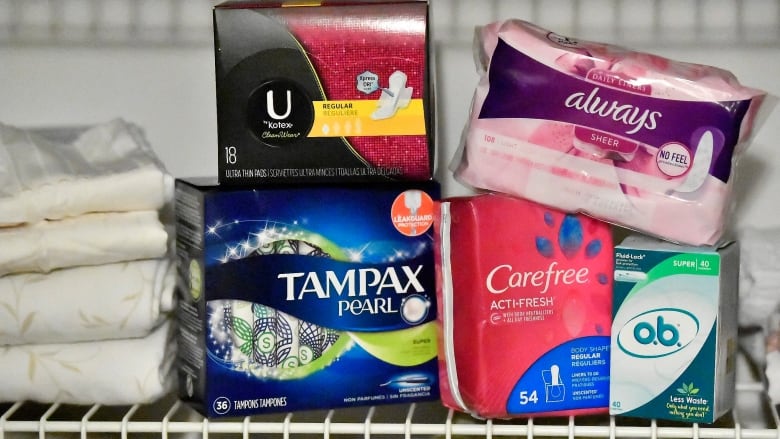Hamilton rejects putting free menstrual products in some municipal washrooms
Coun. Esther Pauls says she was 'a little bit uncomfortable' with a public menstruation debate

Some thought it was too much money, some thought it was a human rights issue, and some seemed embarrassed to be talking about it at all.
But in the end, Hamilton's board of health voted against a pilot project to put free menstrual products in some municipal washrooms.
Councillors were deciding whether to "work toward" putting free menstrual products in the washrooms of all municipal facilities. That would have started with a few recreation centres and libraries. City staff would have reported back first on how much it would cost.
It was an idea "as milquetoast as you can possibly get," said Coun. John-Paul Danko of Ward 8 (west Mountain). But it failed 7-8.
Those in favour said menstrual products should be available like soap or toilet paper. Those opposed said the city didn't have money for new expenses, and women getting their periods know when it's going to happen anyway.
"As a woman, when I have my period, I would be stocked with the things I have at home before I went out so I was prepared," said Esther Pauls, Ward 7 (central Mountain) councillor. "A woman is always … prepared. So I think I cannot support this."

She referenced the documentary Pad Man, and said when she was growing up, she worked hard to buy her own menstrual products. If she couldn't afford them, she said, "I would ask someone."
"We did this privately," she said. "And I find it a little bit uncomfortable (that) we're talking an hour and a half about this."
Maureen Wilson of Ward 1 pushed for the pilot project, saying access to menstrual products is a health equity issue. She wanted to start with a small number of facilities, then expand it, and eventually bring it to a liaison committee with the school board.
She also wanted to write to the province and ask for a hike in social assistance rates so people who menstruate can afford the average $76 to $153 per year they spend on menstrual products.
Pauls's comments about being uncomfortable talking about menstruation in public, Wilson said, are part of the problem.
"That is a stigma that is attached to menstruating," she said. "This is a natural bodily function, and if we continue to frame it as a private matter, we can't talk about it."

There are low-income Hamiltonians who can't afford menstrual products, said Nrinder Nann, Ward 3 councillor. Some even use cardboard.
All but two of the seven women on council voted against the idea. So did Terry Whitehead (Ward 8), who suggested some sort of economic means test for people to access the menstrual products.
Whitehead said judging from talking to women he knows, and listening to a radio call-in show, "it's amazing how many women are against it."
The board didn't have an estimate of what the pilot program would have cost, but a staff report provided estimates on a broader scale.
Providing menstrual products outright to 6,797 Ontario Works recipients aged 12 to 49 years old would cost about $591,339, the report said. It would cost $636,055 for 7,311 female-identified Ontario Disability Support Program (ODSP) recipients, and $46,284 for the roughly 532 users of women's shelters.
This is so frustrating. Completely absent from today’s debate was the fact that for some people with uteruses, *particularly* trans men, 2 spirit, and nonbinary people, being “on your period” is an incredibly dangerous time. Lack of access to menstrual products can be deadly. <a href="https://t.co/CpxSDaMOzq">https://t.co/CpxSDaMOzq</a>
—@sgeffrosHalima Al-Hatimy, founder of the FemCare Community Health Initiative, brought the subject to councillors in December. She's disappointed, especially with Pauls's comments.
Councillors should base their decisions on research, she said. And people don't always know when their periods are going to start.
As a woman councillor, Al-Hatimy said, "I'd expect her to be a little bit more enlightened in how she approached the conversation."
The comments, she said, are "actually quite disturbing."
City council still has to ratify the decision on May 22.
How they voted
Opposed to working toward providing free menstrual products in municipal washrooms, which would start with a pilot project in a handful of facilities
Esther Pauls (7), Brad Clark (9), Maria Pearson (10), Brenda Johnson (11), Lloyd Ferguson (12), Arlene VanderBeek (13), Terry Whitehead (14), Judi Partridge (15).
In favour
Maureen Wilson (1), Jason Farr (2), Nrinder Nann (3), Chad Collins (5), Tom Jackson (6), John-Paul Danko (8), Mayor Fred Eisenberger.

